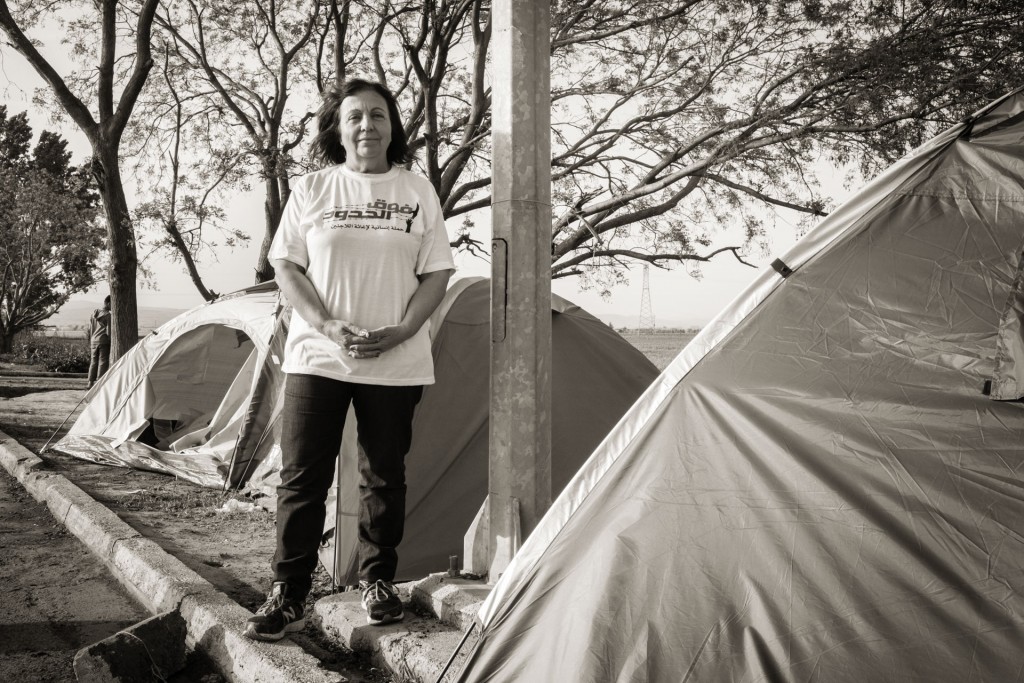One of the girls pointed out at a young boy and told me that all of his family drowned in the sea on the way from Turkey to Greece. During the nine days I was there I heard sad stories about families that were torn up between their home land and European countries and the camps, Palestinian residents from Syrian camps that left their homes and families for the third time.
Mary Tanous :: Age 60 :: Nurse :: Palestinian
I am Mary Tanous , 60 years old and a mother of three. My husband died of cancer four years ago. I am a nurse in a senior position in the public health organization. I am a Palestinian, a resident of the State of Israel and I hold an Israeli passport.
In the past year I felt a strong need to volunteer and help the Syrian refugees. I contacted young people who left for the islands in order to join them, but it didn’t work out. (I volunteer and one of the founders of ‘Friends To Marrow’, an association which tried to expand the number of potential Arab bone marrow donators in the country).
The truth is that a year after the revolution in Syria started I stopped following and listening to the news from there. I felt pain and frustration that were beyond what I could bear. Every few weeks I checked who was leaving and when, and three times the dates coincided with my work in the association.
The decision to volunteer for the refugees was because I felt I must do something to help, even a little, and I can no longer carry on as usual while so many people were suffering.
My close family, my children, my mother and my sisters were not surprised. They encouraged me, and so did my colleagues. They all said this decision takes a lot of guts, which they don’t have, and that they definitely salute me for it.
I didn’t know much about the camps. A day before I left I checked with my son the location of the camps and I read a little about the life there. Before the flight I prepared myself for the harsh reality in the camps (and I have the ability and the experience because of my work, and after what I’ve been through with my husband during his illness). But with all the preparations, the reality in Idomeni camp was harsher.
I left with 3 youngsters I didn’t know. Two women and a man. We all had one goal – to help. There were many situations that affected me: on the first day I was sitting with children in a makeshift tent, and I gave them papers and crayons. One of the girls pointed out at a young boy and told me that all of his family drowned in the sea on the way from Turkey to Greece. During the nine days I was there I heard sad stories about families that were torn up between their home land and European countries and the camps, Palestinian residents from Syrian camps that left their homes and families for the third time.
My meetings with the camp’s kids were important to me, and that was one of my goals. I brought with me papers, crayons, balloons, and I bought stuff there. The activity with the kids made them happy and temporarily disconnected them from the hard reality – the five year war in Syria.
There are 6-8 year old children who never had a chance to be at school, and youngster, 14-year olds, who have been out of any kind of framework for five years.
We bought products and distributed to children and to adults, and here you are exposed to their hardships – you see grownup people stand in line and sometimes push their way through. This experience was very hard for me.
I had many encounters, and some of them I will not forget, like that six-year-old child, a lonely child from the capital, from street number 30, who told me he had a chance to be in school one year. Their house was bombed and they moved to the grandparents’ house, which was also bombed, and then the grandparents suggested they flee through Turkey. He told me how they used the help of smugglers to reach Idomeni, and that his father was missing.
The story of this family could be used for a long feature film or for a series, with no happy end.
What did I take with me – reality can be harder than what we think or imagine. There is no immunity from difficult situations, and every nation/people can find itself in the same place like the Syrians.
Live your day to day life with proportions.
I fear for all those living in the camps, how will they be able to rehabilitate in western countries, part of them with no education and all of them with no means to begin new lives. We all understand the difficulties of absorbing immigrants from the past. The most difficult thing was the uncertainty they all expressed about their futures. It was hard for me to meet 16-18 year old youngsters, whose parents made them flee so they won’t have to go to the army, most of them lonely, not knowing where they will end up or where they will meet their families. As a mother this situation was very hard for me.
The low numbers of Arab volunteers, or Arab speaking volunteers, is standing out, and it also painful. I know many who came to the islands.
We met charming people, generous and civilized people. I was fun talking to them, and I hope to keep in touch with some of them. I hope the borders would open and that the refugees will move to more humane places.


Would you like to share your thoughts?
Your email address will not be published. Required fields are marked *